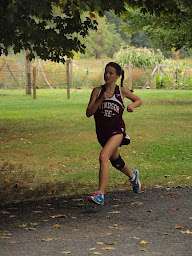No Pain No Gain, Right?
Pain is often
talked about as something we should “push through,” that if we stop to rest and
heal, then we are weak. Whether it is physical, emotional, or mental pain, we
are encouraged to battle through. “No pain, no gain,” as the saying goes.
I first learned this grueling and
unrealistic mentality from playing softball. I learned from a relatively young
age that pushing through pain made me stronger. I would be viewed as a tougher
athlete if I were able to stifle my tears and continue playing after getting
hit by a ball or slammed into by another player. Bruises made me tough. I
remember my teammates and I showing off the red, raw, and sometimes bloody
marks on our thighs after sliding into bases. It was a badge honor.
After
quitting softball, I learned to love a different kind of pain. When I began running
cross country, I learned to love the feeling of being sore and exhausted after
a hard workout.
In
both sports, I associated feeling some amount of pain with having worked hard
enough.
However, this association changed when
I acquired my first overuse injury after my first season of cross country. I
noticed the pain I felt from this injury was different from any pain I had ever
felt. It was not just the general soreness or fatigue I would commonly feel
from running. It was not like my bruises from softball; it had not come from
any physical trauma. This pain came out of seemingly nowhere and was more of an
intense and lingering pain that was concentrated just in my right knee.
It
was a pain that begged to be heard. As hard as I tried, I could not ignore it.
With every step, my knee felt like it was splitting open. My body seemed to be screaming
at me to stop.
When I finally saw a physical
therapist, I was told I had patellar femoral pain syndrome. I was told to stop
running for six weeks and to do various stretches and exercises.
“Stop
running?” I thought to myself, “For six weeks?” It was hard to wrap my mind
around. Resting went against everything I had internalized: If I stopped
running, I would become weak; I would at the very least be perceived as weak; I
would surely lose all my hard-earned fitness!
As
I acquired more and more injuries over the coming years, I could not shake this
mentality. I could not let go of the notion that rest was for the weak, that resting
would make me weak. Because of my impatience, I always attempted running far
earlier than my physical therapists and athletic trainers recommended. And I
always regretted it. My premature trial run always set me back weeks from my predicted
recovery date. Because of my stubbornness and unhealthy attitude around pain, I
was injured for more time out of the year than I was not.
I
remember feeling angry at my body for constantly being in pain. Every time I
got injured, I felt personally attacked. I convinced myself that I was being unfairly
punished for just trying to be a good runner. I desperately wished to turn my
pain receptors off. Then, I could be unstoppable. I thought that only then, would
I finally be a good runner.
What
I did not understand was that my pain was trying to tell me something. I did
not understand that humans feel pain for a reason, that people without pain
receptors still get injured and are more at risk for even more serious injuries
since there is nothing in them telling them to stop. I needed to learn that
pain was a helpful tool in gaining insight in what was happening in my body.
I
was forced to learn this when I started experiencing chronic back pain in the Fall of my junior year of college. (In the four years between my first injury
and this one, I had hurt almost every part of my body from the waist down
multiple times.) It was during this time that I could hardly walk without pain
shooting up and down my spine. Athletic trainers could not tell me what was
wrong, just that I had several rope knots in my back. Doctors and surgeons could
not find anything from my MRI and x-rays. They assured me that there was
nothing wrong- that I could keep running- that I should keep running. So,
I did. Some of my teammates were running through serious injuries. Maybe I was
just being a baby. I simply was not handling my pain as well as my teammates. I
just needed to push through it like they were.
Obviously,
this backfired. My pain only got worse. Yet trainers as well as physical therapists
continued to tell me I was fine.
To
help mitigate my mysterious pain, I received a variety of treatments including
reiki, “cupping,” electric stimulation, deep tissue massage, ice baths, and
chiropractic adjustments. None of this helped to alleviate my back pain.
(Later,
my chiropractor from home discovered via x-ray that my spine was twisted like a
twizzler and that was what was causing my pain. I still find it baffling that
no one else up until that point could see it.)
I
had reached the end of my rope. I reluctantly made the decision that I needed to
stop running. I knew that no one else was going to tell me to stop. I knew deep
within me that I needed rest. When confronting my coach, I began sobbing; I could
barely get the words out that I needed to quit mid-season.
I
felt like a failure. I felt that I had given in to my pain- that if I were just
tougher, I would have been able to make it through the season. I fell into a lapse
of eating disorder behaviors to cope with this feeling of shame, failure, and
loss of identity. I did not know who I was if I could not run. I did not
recognize the person I was- this person who was feeling such intense emotional,
mental, and physical pain.
However,
it was in this time of rest that I eventually realized that I needed to accept
the pain that I was in. Being angry at my pain was not going to make it away.
In fact, anxiety and anger seemed to make it much worse. I finally accepted
that although one day I knew my pain would subside, I had to learn to coexist
with my pain as it was occurring.
I
had to listen to my pain. What was it telling me? Perhaps it was an indicator
that I was overtraining, not fueling properly, or that I was dealing with
unresolved emotions.
In this, I stopped ignoring my
pain. After all, my pain was not some entity outside of me. My pain was a part
of me. It was my body trying to communicate to me that something was wrong.
I
still at times feel that same lingering pain in my back. I also am not immune
to occasional injuries. However, because my identity is not tied to running or
intensely working out anymore, I do not feel as emotional about it. The
pain I do feel does not last nearly as long as it used to.
I
am more proactive in preventing injuries. To combat potential injuries, I try
my best to relax by taking warm baths and finding my happy place. I have also worked
hard to strengthen my core and other muscles with stretching, Pilates, eating
an adequate amount of food, and taking a rest day. I would be lying if I said I
do not still feel frustrated when I am in pain, however, if I tell myself that
at some point it will end, I feel much calmer and my pain subsides more
quickly.
So,
I guess in the end, the saying “no pain, no gain” is somewhat true. If I never got
injured, I would have remained unaware of the damage I was doing to my body. Without
pain, I would not have ever known rest. Without pain, I would not be the strong
person I am today.
So
please, if you are experiencing pain (in any kind), do not ignore it. Instead,
ask it, what is it telling you? How can you or a medical/mental health professional
help to mitigate your pain?
Stay
safe and be kind.
With
love,
Emily




Comments
Post a Comment